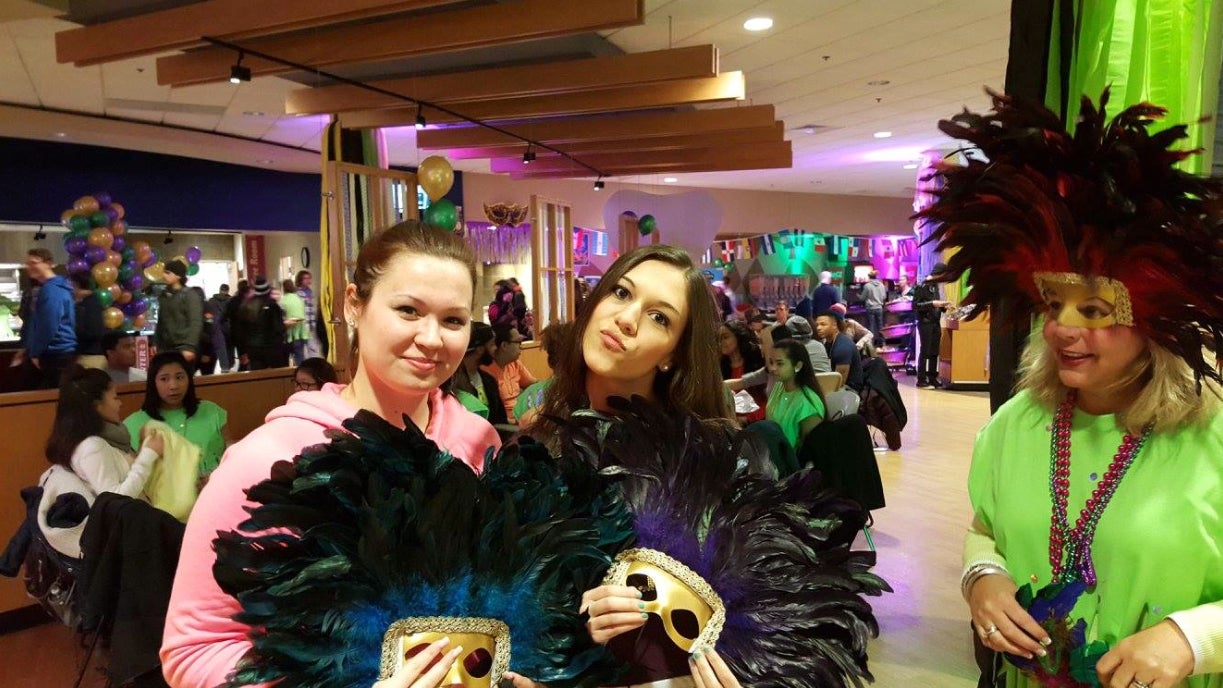KINGSTON, R.I. – July 12, 2016 — Students stepping into Mainfare at the University of Rhode Island’s Hope Commons are sometimes transported from the Kingston campus to far away times and places such as the first-class dining saloon of the Titanic, the mushroom-populated land of Super Mario Bros., or Brazil’s celebration of Carnival.
That’s because each year, the University’s Dining Services staff creates special dining experiences for students, treating them to a sensory feast for the eyes, nose and, most of all, the taste buds.
The University’s most recent dining event, a Brazilian Carnival theme night held Feb. 9, was so spectacular, the National Association of College and University Food Services awarded dining services the bronze award for Residential Dining – Special Event in its annual contest. University representatives will accept the award July 13 at a national conference in Anaheim, Calif.
“We love to break up the monotony,” said Steve Mello, director of URI Dining and Retail Food Services. “These theme nights have been ongoing each semester for the last 15 years.”
URI also earned honors from the food services organization in 2008, 2009, 2010 and 2012, for day-to-day operations of dining halls including Mainfare and Corner Store at Hope Commons. Other theme nights have included Guitar Hero and Beatlemania.
For this year’s contest, Dining Services created a contest book that included presentations of eye-catching brochures and advertisements for the Carnival event, facts about student participation and menu creation, and vibrant photos of the South American cuisine and the students and faculty who enjoyed it.
Mello said the Carnival theme night was a roaring success, with student participation outpacing a normal night at the Mainfare. Attendance soared to 2,376 during Carnival, an uptick of 15 percent over the average attendance of 2,033 during other Tuesdays in February. Dining services doubled the number of empanadas served from 650 to 1,300, selling out of the item, which is usually not a hot seller.
Mello said the idea for a South American cuisine-inspired theme night grew out of the staff’s interaction with Brazilian students attending the University through the Associates in Cultural Exchange language program.
“They became friends with one of the cooks here, and began sharing the foods they liked,” Mello said. “We got together as a department and decided to make an event out of it so they could share their culture with other students on campus. The students helped us by providing recipes and working with us to create a menu. They were really a part of the team.”
The staff spent time crafting a menu consisting entirely of homemade, authentic South American food, testing the recipes – paying careful attention to make them allergy safe – making sure they could accommodate foodservice for more than 2,000 students, faculty and staff. The food was locally sourced through URI’s continued involvement with the Rhode Island Farm to School Project and the URI Agronomy Farm provided herbs and vegetables. Local vendors supplied the meats, and all fish served was certified sustainable by the Marine Stewardship Council.
[pullquote]“These theme nights have been ongoing each semester for the last 15 years.”[/pullquote]Since some of the food would be unfamiliar to their guests, dining services created signs that explained each item on the menu. The staff members also created marketing materials such as fliers, posters and online announcements to build buzz for the event.
When the evening finally arrived, students were welcomed by dancers, music and mocktails, large-scale decorations, and special lighting, creating a street party atmosphere in the dining hall.
“The staff really loves these events and gets excited about them,” Mello said. “It is a lot of work, but it’s gratifying at the same time. It gives our dining halls a wow factor. We had photo booths with masks and props so the students and faculty could take pictures, to make it an event they will hopefully remember.”

